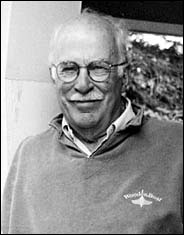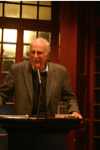Roger Angell
February 28–March 1, 2005
- Reading: Streaming video
- Discussion: Streaming video, segmented discussion, MP3 audio
- Angell reading an exerpt from his famous essay about the Boston Red Sox Game 6 of the 1975 World Series
- Photos from Angell's visit
- Angell's praise of the students and of the Kelly Writers House
- A blog entry on Angell
- This event is featured in Eric Karlan's Notes from the Green Couch, a series of summaries and analyses of Writers House events
- See the Kelly Writers House calendar entry for more about this event
- 2005 Fellows seminar notes
Bio

"Roger Angell is the clear-eyed poet laureate of baseball. His books are like long, wonderful strings of base hits by the home team. You don't want them to end."
--The New York Post
An essayist and fiction editor for the New Yorker, Roger Angell's meditative essays on baseball have earned him the reputation as one of the greatest sportswriters of all time. The New York Times Book Review compared the experience of reading Angell to "watching a game unfold in its own good time over a long afternoon, hoping it will go into extra innings and last until sundown." Known for reporting as a fan as well as a member of the press, he elevates writing about sports to an art form. The editors of the New York Review of Books praised Angell's collection The Summer Game (1972), for its "searching for the Higher Game, the cosmology behind each pitch, each swing, each shared joy and ridiculous hope of summer's long adventure." Angell's other books on the national pastime include Late Innings (1982), Season Ticket (1983), Five Seasons (1988), Once More Around the Park (1991) and Game Time (2003). He is the author of the introduction to the latest edition of The Elements of Style, a guide to writing by William Strunk and E.B. White, Angell's stepfather. His own collection of fiction The Stone Arbor and Other Stories was published in 1960.
Segmented Discussion:
- introduction (4:19): MP3
- trust and telling family stories (3:05): MP3
- writing about catching (4:45): MP3
- writing styles: lists and knuckle balls (5:11): MP3
- writerly influences (3:03): MP3
- baseball as a celebration (3:01): MP3
- box scores: miniature narratives (2:02): MP3
- changes in the box score (1:42): MP3
- genre writing (2:27): MP3
- length of games (2:08): MP3
- the Yankees and the Giants (1:54): MP3
- baseball after 9/11 (4:02): MP3
- Jackie Robinson (2:45): MP3
- memory and sports writing (2:56): MP3
- working at the New Yorker (1:40): MP3
- personal license (3:06): MP3
- writing in other genres (2:02): MP3
- steroids (2:20): MP3
- pigeon hole or expertise (1:43): MP3
- talk radio (5:31): MP3
- writing in the present tense (2:14): MP3
- more Met than Yankee: writing about loss (5:31): MP3
- reading from "Agincourt and After" (5:23): MP3
complete reading (1:12:51): MP3
Angell's praise of the students and of the Kelly Writers House
Thanks can't begin to express the pleasure and stimulation and challenge and sense of unending welcome that I experienced with you and your students and colleagues on Monday and Tuesday. I have done this sort of thing before but never at this level of intensity and kindness and involvement. I was particularly struck by the students who sat in that intently listening, eagerly questioning circle and gave me their attention. I remember a few faces, and I'm still surprised and touched at the way so many came back to me later with further questions and compliments. All this began with the intense reading and discussion of my writings that you'd instituted long before I arrived; everyone knew my work well, which is an absolute heaven for a writer, of course, and much rarer than you'd imagine. I'd never encountered a curriculum anything like this. Our group discussions became personal and at times emotional, but always in an atmosphere of collaboration and searching interest. There was none of the hauteur and wary boredom that I've often encountered with bright upper-level students - particularly the memoirs - in fresh and dangerously exalted ways. I learned as much from our encounter as anyone else. This is to say thanks again to each and all - I'll never forget you - and to wish the best of luck to you and your writings, as well.









